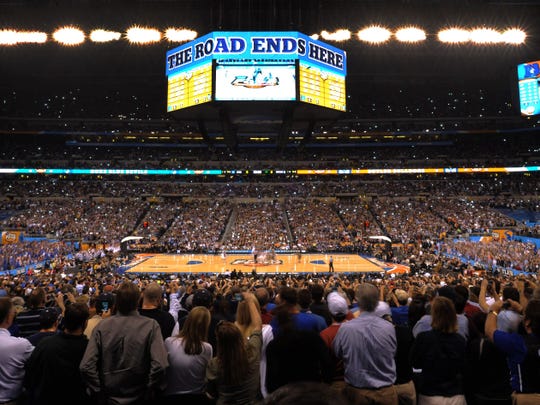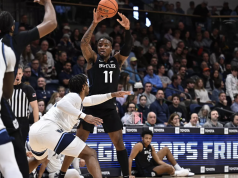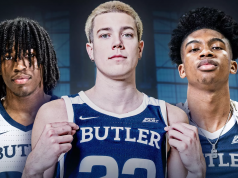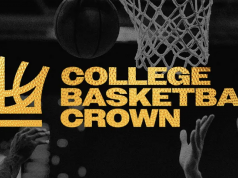Ten years have passed since Butler made their historic run in the NCAA tournament. Only inches kept the school away from going home with the trophy. Nobody had an experience like former commentator Joe Gentry. He grew up a Hoosier and pursued a career in the broadcast industry. He has a deep bond with Butler University in many aspects. Years before the school’s basketball program could even sniff the national stage, he was a student broadcaster. Like many, he was just beginning to get his feet wet.
You graduated as part of the class of ’86. I want to get a sense as to what the university was like then. In a short span of time it changes so much. Even since I started four
years ago it’s changed quite a bit. So, what was the day in the life of a Butler student during the mid-80s? Are there major differences in terms of class attendance and more?
Joe Gentry: Physically it’s changed. There was once a street running down the middle of campus where the lawn is. It’s hard for younger people to picture that. You had a two-way street running right in the median. Clearly a different feel to campus than what it is now. As a student, I was in radio/television and a big difference is we had a 48-thousand-watt radio station. We got to do games on the air and do newscasts and play classical music.
The other thing was going to basketball games. I could walk in 12 minutes until 7pm and I could sit down in the second row. We were playing Division 1 basketball and we had some good teams then, but it was nothing like it is now. I’m old enough now to know that in 1989 the school said, “We’re going to commit resources to basketball to grow the university.” Fast-forward 20 years from that and we’re playing for the Final Four in Indianapolis and an independent firm quantified that we got $640 million of publicity out of that.
You mentioned the radio station that was on campus at the time. Was that your first experience with broadcasting? What was that like?
Joe: I was very fortunate that I had two Butler grads at my high school, Lafayette Jeff. They both went into radio/tv and kind of blazed my path. One of the interesting things is to do games you had to get cleared before you could go on the air. You had a cassette and you go to the game and talk into a recorder. Then our Department Chair would listen to that and say either you’re ready or you’re not ready yet.
A funny thing on the basketball note is that the university carried classical music as I mentioned. They carried the Metropolitan Opera and there’s no set run time for it. So, I was doing a game with Scott Hoke and we literally came on with 11 seconds to go and the game was tied. The game went to overtime against Indiana State. That was something I’ll never forget.
How do you prepare yourself for that type of situation?
Joe: Just do your preparation like you’re doing the whole game and try to call it in your head. Be ready to go and quickly give listeners a synopsis of what happened if they missed it. Games were not on TV then, so all they had was the radio.
The day after graduating from Butler, Gentry began working in news from Richmond, Indiana, while also getting a chance to cover high school football and basketball. He had the chance to call the state championship game. A year later, he returned to Butler to work as a Graduate-Assistant for Sports Information Director, Jim McGrath. Later, he found a role at the University of Indianapolis calling games and working within the athletics department. Eventually in 2006, Gentry was given the nod to begin taking on the role as the play-by-play commentator for Butler Basketball’s radio broadcasts.
How did you get into the position to get the job and what was your response?
Joe: My day job at the time was the Director of Corporate Partnership, the radio piece was along with it. It was a dream to come back and work for Butler Athletics. I graduated in ’86 and came back in ’06. I worked at a lot of good places, but with 20 years away and Butler being special to me, it meant a lot.
Butler’s team had changed a lot in your absence and perhaps more so in your time as a commentator. What was it like to see this team develop from a broadcaster’s perspective?
Joe: It was pretty amazing because it came so quickly. I think this current run of the last 14 years of Butler’s success in basketball with 11 NCAA tournaments; We’ll count the one we would have made this year.
Describing the 2006 NIT Season Tip-Off
It’s a one possession game against Notre Dame, we’re playing at Bankers Life Fieldhouse – Butler blocks a shot. You beat Notre Dame, then we’re playing Indiana the next night. We’re down double digits in that game and we came back to win that. Next thing you know, we’re going to New York and people didn’t expect that…Friday Night, Madison Square Garden, and Butler brings home the trophy.
We’re leaving from the airport in New Jersey on an 8pm flight. We got home at 3am and they had a home game against Kent State that night. So, this Butler team that had just beat Gonzaga in New York on Friday night had to come back and win a double-overtime game Saturday.
…I think our team in ’06-’07 believed they could do it. Florida won back-to-back NCAA titles and I don’t know if anyone gave them as tough of a game as we did. What’s funny is I could look at one end and you have six NBA draft picks and Butler literally had a doctor, a dentist, an actuarial. You’d think, “How can those guys play with those guys?” But it’s a team game and those guys really showed that and were right there ‘til the end.
Did you have any preconceptions that the 2010 team would go as deep into the tournament as they did? There was about a 3-month period where they didn’t lose during the regular season. Were there any hints this team could go all the way?
Joe: That team was ranked 11th in preseason polls but they did go through some rough patches. They had a tournament in Anaheim and lost two of three there…and I vividly remember the last game they lost right before Christmas they lost to UAB. That team went from Christmas to Easter without losing. They put it together. That team had the bullseye on its back playing in the Horizon league being the top-25 team. They went undefeated in conference play which is hard to do when you’re taking everybody’s best shot.
Come tournament time, Butler was involved in what Gentry calls “the perfect storm.” Having gone toe-to-toe with seemingly every opponent they faced, Butler had the confidence that they could beat anyone. Still, others doubted what the Bulldogs could accomplish. As a #5 seed, many predicted that they’d lose to the #12 seed UTEP, a common choice among bracket experts when looking for upsets in the Round of 64. UTEP lead at the half but Shelvin Mack put on a great performance to help the Bulldogs come out on top.
Butler then played #11 Murray State who upset #4 Vanderbilt. Murray State had a similar stature to Butler as a mid-major school trying to prove itself. Butler trailed by 7 with 15 minutes to go. Ronal Nored, known for as Butler’s defensive powerhouse, lead the team in points. The Bulldogs climbed back and escaped with a victory to head to the Sweet 16.
Joe: For me, I knew that the team’s last game that season was also my last game because corporate sponsorship had taken over. So, in a sense, I was like a senior on that team like Willie Veasley. His last game was my last game. I can really feel the excitement they have when they know they’re going to the Sweet 16.
The following week, it’s the same scenario. In Salt Lake City, Butler took on #1 seeded Syracuse. The Bulldogs had never trekked beyond the Sweet 16, but now had their shot. Butler went up early but the Orange climbed back to regain the lead. After going 1/8 from deep in the second half, back-to-back three pointers were hit to regain the lead and help Butler hang on.
After taking down Kansas State, Butler found themselves in the Final Four. Head coach Brad Stevens had the bus take the team past Lucas Oil Stadium to show the team that all they had accomplished would be tested in that building.
It seems like you remember so much about this team with such crystal clarity. Everything down to the specific stats to the plays themselves. Is there any part of it that gets fuzzy or does it all replay in your head whenever you look back on it?
Joe: It was literally living a dream. The most fuzzy thing I’d say is the whole week leading up to the Final Four. There was so much going on and so much to think about coming up. But I’ll never forget getting back after the Regional at 2am. We get to Hinkle and there’s more than a thousand people there. The guy carrying the trophy off the bus is Nick Rogers. He’s a senior walk-on but he’s the senior so he gets to carry the trophy. I had a tear in my eye. That’s the biggest thrill I’ve ever had in Hinkle – being with the team as they’re bringing that Midwest Regional Championship trophy back. Me and a lot of other people I went to Butler with never could have dreamed that this could be possible.
The season reached its very end in the national championship against Duke. The rest is history for Butler fans. But Gentry had a better seat in the house than most.
Not many get to call a national championship game, period. Here you are calling the national championship, for not just any team in any place, but your alma mater in their own backyard of Indianapolis. Can you describe what it’s like being thrust into that situation?
Joe: There were 30-thousand people at our own open practice. That’s when it hit for me and for the team, which was good. It allowed us to soak it up then rather than in the game when you have to focus. The whole script of the journey was a Hollywood movie. The last page of that script would have been [Gordon Hayward’s] shot going in. I’d love for someone to show me what it would have looked like had that ball gone in. I’m a big hockey fan. I love “Miracle”, but it wouldn’t have even been close to Butler winning a national championship on that shot. I think the guys would’ve walked the trophy straight up Meridian St right back to Hinkle. Even with the loss, what it’s done for Butler has been amazing.
Since that game, Butler has grown exponentially in a number of different facets. Gentry knows that kids today who were in middle school watching that game might grow up to decide to come to Butler. Knowing he’s a part of that journey and has been a contributor to this ongoing saga of Butler Basketball brings him pride and joy.










